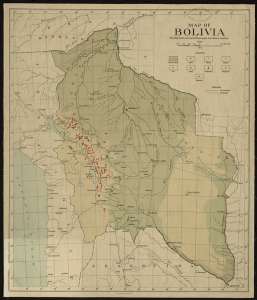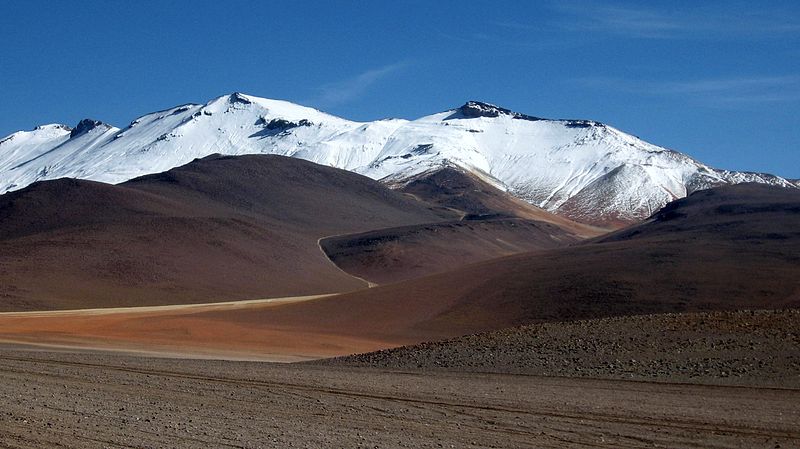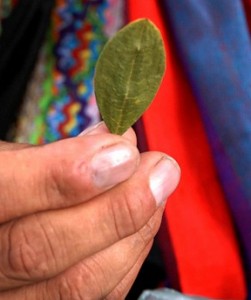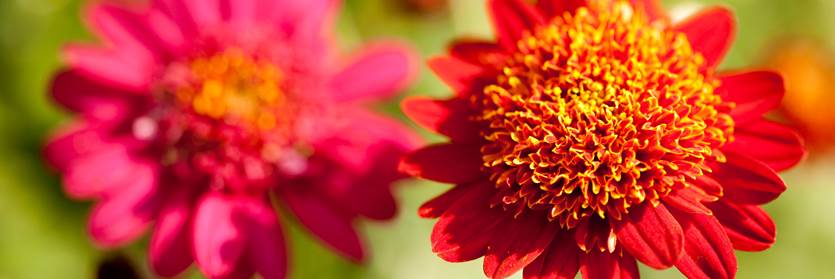The Diary of H.H. Rusby: Slowly Down the Mountain
Posted in Science on July 6 2013, by Anthony Kirchgessner
 Rusby, his health still failing, is calm and collected when confronted by bandits. But efforts to get to a lower, warmer altitude are proving difficult. Additionally, the expedition supplies arrive but with a heavy price tag.
Rusby, his health still failing, is calm and collected when confronted by bandits. But efforts to get to a lower, warmer altitude are proving difficult. Additionally, the expedition supplies arrive but with a heavy price tag.
In between the struggles of securing mules for the trip out of the mountains, paying for a botched shipping job, and battling the effects of dysentery, Rusby manages a few moments to sample the local flora, hopeful of the arrival of proper drying equipment.
OFFICIAL DIARY of the MULFORD BIOLOGICAL EXPLORATION OF THE AMAZON BASIN
H. H. RUSBY, DIRECTOR
WEDNESDAY, JULY 6, 1921
Last night was not only most uncomfortable, owing to the cold, but I became anxious about my poor lung condition. It was a great relief when morning and sunshine appeared, yet I felt very bad and a little discouraged as to my future. After breakfast, with strong coffee and a little strychnine, I felt somewhat better, but the slightest physical effort caused me to gasp severely for breath.
When the arriero left us I ordered him to secure mules for us in Quime and send them on to take us to Canamina. But no mules arrived during the day. This is doubtless due to the fact that there is a big feast underway which lasts a week and all mules are requisitioned for this event.
I managed to brace up sufficiently to skirt the lower part of the mountain and take note of its plants. There is a huge cliff about 700 feet high and within 100 hundred yards. Its face is festooned with vegetation, the Florida moss being most prominent and very beautiful, since it makes it appear as though the whole face of the cliff were waving in the wind. There are also many large and small bromeliads and a huge Eryngium, several lovely Cotyledons, two rock growing Peperomias, many ferns, in widely separated generae, at least one Xanthoxylum and a great deal of the pink Chuquiragua, Baccharis of several species, a Serjania, two species of Rubus, a Gynerium, two or three Fagelias, three Gerardia allies, a Convolvulacea with thick succulent leaves, a Cestrum and a number of plants of which I did not know the relationship.
This walk made me perspire freely which greatly improved my condition.
In the afternoon, while Mr. McCarty was out with his rifle, a man and a sixteen year old boy rode up to the tent and dismounted. Everything indicated that their intentions were bad and I quickly became sure that they were contemplating robbery. I noted pistols projecting under their coats. They tried to get between me and my gun which lay nearby and I at once picked it up. Each in turn tried to get behind me but I prevented them. All their questions appeared designed to secure information which would contain suggestions as to our supply of money and each of them in turn lifted a strong box and remarked on its weight. I managed my replies so as to suggest that I was very short of funds and was going to secure them in Canamina. I was immediately asked when I intended to return. McCarty returned presently, armed with rifle and pistol and the man appeared much put-out and they soon left. McCarty then told me that he had seen them coming, he being on a hill and that when they were in the bushes near the tent, they had dismounted and taken something from their saddle bags, doubtless their revolvers. We decided that it was not prudent for both of us to sleep at once and we arranged for each to watch during half the night. McCarty retired early and I stood guard, sitting on a trunk, well wrapped up in blankets.

THURSDAY, JULY 7, 1921
I had a miserable night, it was extremely cold. McCarty had a bad sore throat and I had given him medicine, before retiring, to promote perspiration. I was afraid to have him get up when his turn came but I got under my blankets for warmth but dozed only at times till morning. Today I learned that last night was the coldest ever recorded at Pongo, where a temperature record is kept.
After breakfast, we decided that it was absolutely necessary to secure some information about mules. I could not possibly walk to Quime myself and Mr. McCarty undertook to do so, getting a horse there and riding to Pongo.
During the day I busied myself in writing. He returned toward evening with the information that our party will arrive at Pongo tomorrow and will pass here and pick us up the next day for Canamina.
FRIDAY, JULY 8, 1921
We had another very cold night but had arranged our beds so that we kept warmer than here-to-fore. Our bed rolls are a great comfort, as they can be fastened up so as to keep the blankets in place.
I felt much better today and climbed high up the mountain with little discomfort in breathing. We both have a mean catarrh, with profuse mucus of an extremely tenacious character, a trouble that is very common among people here and higher up.
Knowing that our party will be along to-morrow with drying paper, I collected about twenty species to-day and wrapped them in water-proof to be ready for pressing.
Mr. McCarty shot a dove, of a very peculiar appearance, which is very common here. There are also many small partridges here, but we have no cartridges except a few loaded with buckshot.
SATURDAY, JULY 9, 1921
The day passed without incident, except that I have felt myself in great need of getting down to a lower place, where I can breathe easier, and where it is warmer, so that I can recover from my lung congestion, bronchitis and rheumatism.
We wait anxiously for information of the arrival of the party, and the proposed start for Canamina. We make several attempts to get mules to take us on, without waiting for them, but do not succeed, and retire early to escape the cold, still in the waiting mood.
SUNDAY, JULY 10, 1921
Today I find myself so much worse that I begin to be quite anxious about the outcome of conditions, and a little discouraged. McCarty and myself hold a council of war and decide that it is absolutely necessary that we get mules from some source and seek safety in a lower place. We decide to have him go to Pongo and appeal for aid. We send an Indian to the hotel in Quime to seek an animal on which he can ride to Pongo. It is nearly night when the horse arrives, so he cannot possibly go and return today. We finally agree that it is better to leave me alone tonight than to give up the plan, so he starts off. I try to eat a little supper and retire to rest about 5 o’clock.
MONDAY, JULY 11, 1921
I rose early this morning, because I felt too miserable to lie abed any longer. I suffered much with dyspnoea, and was also cold. I had pain in my left lung and also rheumatism in the shoulders, and my tooth showed clear evidence of ulceration.
I did not care for any breakfast, and after sitting by the camp fire for some time, I felt pretty well discouraged. In the midst of this misery, I was rejoiced to see Mr. Brown riding up to the fire, to tell me that Mr. McCarty and an arriero were just behind, with mules to take us to Canamina. This meant for me a chance to get to a lower and warmer place before it was too late to do me any good, I began at once to pack up and Mr. Brown insisted on doing all the difficult things, and all the required strength, for I was too weak to exert any strength. Soon McCarty came and he and the arriero finished, while Mr. Brown reported matters to me.
Dr. Mann had had grip in La Paz, but was better.
The freight arriero had demanded 250.00 Bolivianos extra for keeping his mules 8 days in La Paz while waiting for our cargo. He also demanded $250.00 extra for the journey from Espia to Canamina, which was not the original agreement.
The freight from Arica to La Paz by passenger train had cost 700.00 more than it would have done by freight, besides the heavy additional expense entailed by our waiting.
The truck had not come in time to take them to the train, so they had been obliged to wait three more days for the next train.
The cook had not come as agreed on, so they had come without a cook.
All this showed, to my mind, clear negligence. Not one of these things should have been allowed to happen. Not one of them would have happened, had I been there in charge. We have lost more than ten days time and more than $1000.00, just because the man in charge has not executed my plans, which were perfectly made, and provided against every contingency.
This news from Mr. Brown did not tend to relieve my misery, and I left in a very dejected state, but there was worse to follow for I soon developed every indication of amoebic dysentery, and Mr. McCarty also showed similar symptoms. However, he had eaten a green banana and drank a bottle of beer, followed by vomiting and purging, which would well account for his trouble. For me there was no such cause and I had to attribute it to the drinking water. As my symptoms increased, I decided on taking hypodermics of emetine, and I took two each of ½ grain.
During the day, I did little but cling to my mule and grip the saddle with my hands and grit my teeth. I had no thermometer where I could use it, but judged that my temperature was about 103. I drank much water, at all clear streams, and my bowels were quite painful. I could take no food. By mid-afternoon, I could go no farther, and we camped where the trail leaves the Quime valley and strikes across the ranges of mountains. I felt very sick indeed, worse than I cared to tell my companions, and I went to bed as soon as my cot could be put up. We did not trouble to put up any tent.
TUESDAY, JULY 12, 1921
I felt a little better this morning, but not well enough to get up early. I could not eat anything. The ride was a hard one, up and down over ranges of mountains and I suffered severely, I scarcely know how the day passed. The only relief to my situation was the delightful luxurious tropical vegetation through which we passed. Had I been well, it would have been most enjoyable.
We had a wretched breakfast at an Indian ranch. The soup was little more than warm water, and I could not eat.

In the late afternoon we passed a neat looking place near the top of the mountain, where some men were sweeping up coca leaves from the drying floor. I called out in Spanish to inquire where we could find a stopping place, when a sturdy voice replied in English “What did you say?” I nearly fell from my mule with the joy of this meeting. We soon made our situation known to the Norwegian manager of the place, Mr. Nicolas Nicilic, who at once set energetically to work to make us comfortable. Our cots were set up on the clean, warm, flagged coca-floor, and I prepared immediately for bed. In reply to his inquiry about food, I replied that I could eat nothing, when he surprised me by asking if I could not take a glass of fresh hot milk. Indeed I could, and a half of a pitcher of hot milk was quickly put away. This so improved me that I took two soft-boiled eggs also, after which I slept well.
I wish to say just here that I believe I could not have gotten through these days but for the use of small amounts of whiskey. I had brought a bottle of Overholt, and kept it convenient for cases of emergency, and it has kept my natural functions at work when they might have failed. Oh, the account that is to be settled by the dishonest medical men who, perverted by the sentimentalism of prohibition, are willing to give false testimony as to the inefficacy of alcohol as a medicinal agent!


Hi,
I am not sure whether this question has already been asked but I wonder whether this diary was ever printed as a book? I would be interested in buying it.
Thanks,
Christos Tsoukalas